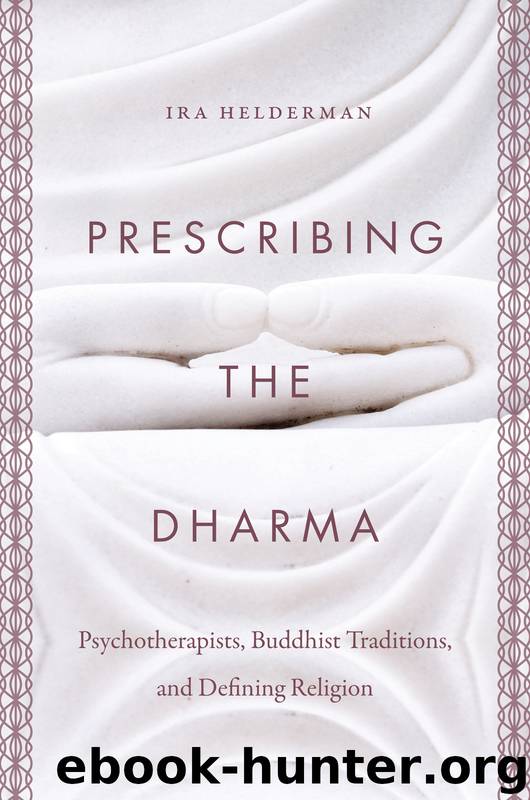Prescribing the Dharma by Helderman Ira;

Author:Helderman, Ira;
Language: eng
Format: epub
Publisher: University of North Carolina Press
Published: 2019-02-28T16:00:00+00:00
Flipping the Script: Field Observations from “The Most Completely Secularized Culture in Human History”
Fromm proposed not only a redefinition of the category of religion, but of the secular as well. And he did so with particular purpose. Fromm was well aware that his theories could be viewed as furthering secularization. He calls for the elimination of the very qualities that typically define the concept of religion, and, as replacement, urges on the rise of new forms that many would not recognize as religious at all. For many, if religious traditions amputate their “theistic-supernatural aspects,” this, by definition, would mean their secularization. But Fromm actively moves to delegitimize such interpretations of his theories. He does this by upending what it means to be authentically religious.
Fromm was well schooled in a number of famous secularization theories. While a student at the University of Heidelberg, he was taught about Max Weber’s ideas directly from the thinker’s brother, Alfred.7 However, far from promoting it, Fromm names secularization to be an illness ailing society. And the secularization he speaks of is not limited to the waning of religious institutions. For Fromm, true secularization is more extensive than Weber had imagined. Weber was wrong; religious institutions are very much not on the wane. In fact, the secularization that concerns Fromm has infected them. Fromm casts himself as a healer returning a repressed true religious essence to religious communities. I can think of no better way to describe this move than in contemporary parlance: he “flips the script.” Fromm not only sorts good from bad religion, but also authentic from inauthentic. It is humanistic religions that are truly religious, precisely because they lack the basic elements that typically define the designation, their “theistic-supernatural aspects.” If the “theistic-supernatural aspects” of religious institutions are extinguished, they will in fact become more authentically religious. Further, Fromm argues that the historical “theistic-supernatural aspects” of religious traditions are actually at the root of the secularization of society. Institutional authorities capitalize on them to suppress a true religiosity in three interconnected ways.
First, and most dramatically for our purposes, Fromm argues that it is theistic dogma that creates, as introduced in chapter 1, “the religion/secular binary.” Binary understandings of religion and secular are not only conceptually flawed in Fromm’s view; they are a pernicious sickness that suppresses human creativity. As we saw above, Fromm initially therapizes the theistic beliefs of most Jewish and Christian forms, analyzing and assessing them using psychotherapeutic frames. Theistic beliefs split off humanity’s capacity for greatness and project it onto imagined divine parental figures. It is thus through psychodynamics, according to Fromm, that “the separation between the ‘holy’ and the ‘secular’ occurs” (1950, 50). Human innovation is made worldly and, consequently, worthless in its impermanence. Humans, belonging to the secular world, are fallen, venal, without their own inherent goodness. Whatever goodness human beings possess becomes only an image of a divinity or divinities. In truth, Fromm claims, it is the other way around. The gods have been made in the image of humanity.
Download
This site does not store any files on its server. We only index and link to content provided by other sites. Please contact the content providers to delete copyright contents if any and email us, we'll remove relevant links or contents immediately.
The Way of Zen by Alan W. Watts(6269)
Ego Is the Enemy by Ryan Holiday(4919)
The Art of Happiness by The Dalai Lama(3833)
The Book of Joy by Dalai Lama(3670)
Why Buddhism is True by Robert Wright(3271)
Spark Joy by Marie Kondo(3070)
Shift into Freedom by Loch Kelly(3016)
Happiness by Matthieu Ricard(2863)
A Monk's Guide to a Clean House and Mind by Shoukei Matsumoto(2773)
The Lost Art of Good Conversation by Sakyong Mipham(2416)
The Meaning of the Library by unknow(2371)
The Third Eye by T. Lobsang Rampa(2162)
The Unfettered Mind: Writings from a Zen Master to a Master Swordsman by Takuan Soho(2150)
Red Shambhala by Andrei Znamenski(2057)
Anthology by T J(2032)
The Diamond Cutter by Geshe Michael Roach(1945)
Thoughts Without A Thinker: Psychotherapy from a Buddhist Perspective by Epstein Mark(1877)
Twilight of Idols and Anti-Christ by Friedrich Nietzsche(1751)
Advice Not Given by Mark Epstein(1749)
